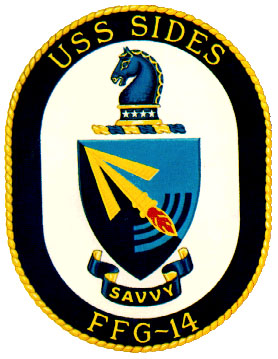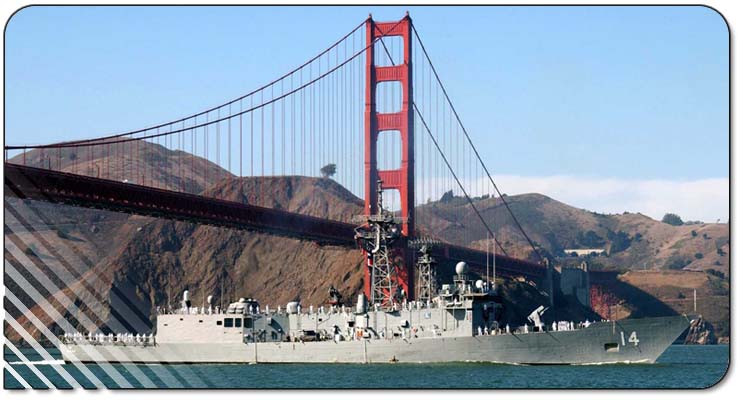Namesake:
Admiral John H. Sides
Throughout a distinguished naval career spanning nearly four decades,
Admiral Sides contributed immensely to the field of weapons,
specifically with regard to shipboard missile systems. The guided
missile frigate SIDES (FFG-14), the first ship so named in his honor,
represents a most appropriate marriage of platform and namesake.
A native of Roslyn, Washington, Admiral Sides received his commission
from the U.S. Naval Academy, having graduated with distinction in the
class of 1925. His early sea tours were served principally aboard
battleships. While ashore he pursued development of his specialty -
ordnance - First, in 1942, as Chief of Ammunition and explosive section
of the Bureau of Ordnance; then in 1948 as Deputy to the Assistant
Chief of Naval Operations for Guided Missiles; in 1951 in the Office of
the Director of Guided Missiles, Office of the Secretary of Defense;
and, most notably, in 1952, as Director of the Guided Missile Division,
Office of the CNO, from which he director the Navy's Guided Missile
Efforts for almost four years.
Admiral Sides at sea commands include: Commander Mine Division Eight
(1944), Commander Destroyer Squadron Forty-Seven (1945), USS ALBANY
(1950), and Commander Cruiser Division Six (1956).
On August 31, 1960, he was appointed Commander in Chief, U.S. Pacific
Fleet, and served in that capacity until 1963 at which time he retired
from active duty. He passed away April 3, 1978 leaving his spouse, the
former Virginia E. Roach and daughter, Mrs. Joanne Savina Sides Watson.
|
DECOMMISSIONING:
Navy Decommissions San Diego-Based USS Sides
Release Date: 2/15/2003 3:00:00 PM By Lt. j.g. Matthew Warke, USS Sides
Public Affairs
SAN DIEGO (NNS) -- Guided-missile frigate USS Sides (FFG 14) marked the
end of a distinguished 21-year naval career Feb. 15.
In a decommissioning ceremony at Naval Station San Diego, dignitaries,
shipmates and friends looked on as the last watch was relieved and the
ship was ceremonially decommissioned.
Sides’ past commanding officers, friends and family of the
ship’s namesake, the late Adm. John H. Sides, assembled to
honor the men who served in the ship. Joanne Sides Watson, Adm.
Sides’ daughter and the ship’s sponsor, was in
attendance.
In 2002, Sides participated in the war on terrorism, conducting
maritime operations in support of Operations Noble Eagle and Enduring
Freedom during her last deployment. Also in 2002, she led a combined
U.S.-Australian task group in defense of strategic interests in the
Indian Ocean.
Adm. John H. Sides was the former commander of the U.S. Pacific Fleet
and is considered the “Father of the Guided-Missile
Navy.” Sides, commissioned May 30, 1981, was designed to
perform offensive and defensive sea control assignments, anti-submarine
warfare screening of naval forces and convoys, anti-air picket
surveillance and general escort operations - tasks she performed
superbly throughout her career.
In 1988, while deployed to the Arabian Gulf, Sides completed a record
32 safe transits of the Strait of Hormuz while escorting oil tankers in
and out of the volatile Gulf region. The ship also participated in
combat operations as part of Operation Praying Mantis, the U.S.
retaliation in response to the Iranian mining of USS Samuel B. Roberts
(FFG 58).
Following the ceremonial decommissioning ceremony, Sides and her crew
of 180 Sailors took to the sea one last time to deliver the ship to her
final storage location in Bremerton, Wash. She will formally
decommission and enter the Inactive Reserve Fleet Feb. 28. |
Ship's Crest:
 The Shield:
Light blue is symbolic of the hours
of daylight and dark blue of the night. Together they connote the 24
hour watch and the vigilance required of warships at sea. The three
arcs on the light blue suggest the very high frequency radio waves of
radar, those on the dark blue symbolize the acoustic waves used in
sonar to detect submerged objects. The broad arrow represents a missile
on course to its target. The Shield:
Light blue is symbolic of the hours
of daylight and dark blue of the night. Together they connote the 24
hour watch and the vigilance required of warships at sea. The three
arcs on the light blue suggest the very high frequency radio waves of
radar, those on the dark blue symbolize the acoustic waves used in
sonar to detect submerged objects. The broad arrow represents a missile
on course to its target.
The Crest: Blue and gold are the
colors
associated with the Navy. The scaled horse's head, alluding to the
heraldic sea horse, represents a knight, one of the pieces in the game
of chess, suggesting at once the personal reputation of Admiral Sides
as a man of knightly character and integrity and as a naval officer
experienced in the strategies of sea warfare. The mullets, heraldic
symbols related to the spurs of a knight, symbolize the four star rank
attained by the Admiral.
|

